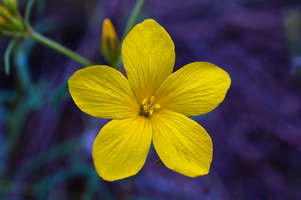
CRISPR-Cas9 Triple Gene Edited Camelina Plant Receives Nonregulated Status
October 10, 2018| |
 Genome-edited Camelina sativa plant lines developed by Yield10 Bioscience, Inc. using CRISPR-Cas9 for increased oil content has received nonregulated status from the USDA Animal and Plant Health Inspection Service (USDA APHIS)'s Biotechnology Regulatory Services (BRS).
Genome-edited Camelina sativa plant lines developed by Yield10 Bioscience, Inc. using CRISPR-Cas9 for increased oil content has received nonregulated status from the USDA Animal and Plant Health Inspection Service (USDA APHIS)'s Biotechnology Regulatory Services (BRS).
Yield10 submitted an "Am I Regulated?" letter to the BRS in May 2018, requesting confirmation of the regulatory status for Camelina plant lines containing combinations of genetic changes to increase oil production based on three gene traits: C3008a, C3008b, and C3009. The response from USDA-APHIS is published in a letter indicating that the plant lines do not meet the definition of a regulated article under 7 CFR Part 340. Yield10 believes that this is the first triple genome-edited plant to receive nonregulated status from USDA-APHIS.
Yield10 has conducted studies in the greenhouse and preliminary results suggest that the triple-edited Camelina lines may have the potential to increase oil content and to improve oil quality. Yield10 intends to study these plant lines in field tests planned for 2019 in the U.S. as part of its development program to increase oil and seed yield in Camelina and canola for specialty oils applications.
For more details, read the news release from Yield10 or read the BRS response.
| |
Biotech Updates is a weekly newsletter of ISAAA, a not-for-profit organization. It is distributed for free to over 22,000 subscribers worldwide to inform them about the key developments in biosciences, especially in biotechnology. Your support will help us in our mission to feed the world with knowledge. You can help by donating as little as $10.
-
See more articles:
-
News from Around the World
- Biotech Has Huge Potential to Transform Uganda's Growth, Minister Says
- Gene Controlling Stem Juiciness in Sorghum Identified
- Gene-edited Soybeans Being Harvested in the US
- Survey: Most Americans Remain Confused About GMOs
- CRISPR-Cas9 Triple Gene Edited Camelina Plant Receives Nonregulated Status
- Biotech Maize to Boost Maize Supply in Pakistan
- Researchers Modify Plant Walls to Make Biofuel Production Easier
- Research Reveals Central Signal Sorting Hub in Plants
- Eustice: Gene-edited Crops Are Necessary
-
Research Highlights
- Scientists Develop Transgenic Potato with Enhanced Tuber Quality and Stress Tolerance
- Cotton Gene Reduces Plant Sensitivity to Stress at Seedling Stage
- Scientists Report Functional Characterization of a Soybean Galactinol Synthase Gene Under Stress Conditions
-
Beyond Crop Biotech
- Genes Responsible for Snapdragon Flower Color Identified
- 25 UK Species' Genomes Sequenced
-
Plant
- Scientists Show that Genome-editing is Highly Specific in Cotton
- Stable, Heritable Gene Edits in Wheat Can Be Produced in 36 Weeks
- Scientists Develop Easy Visual Screening of CRISPR-edited Strawberry and Soybean
- Researchers Develop a Versatile Vector Toolkit Applicable in Rice Gene-editing
-
Read the latest: - Biotech Updates (June 11, 2025)
- Gene Editing Supplement (May 28, 2025)
- Gene Drive Supplement (February 22, 2023)
-
Subscribe to BU: - Share
- Tweet
